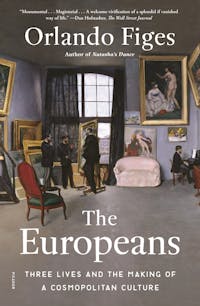The Europeans
Three Lives and the Making of a Cosmopolitan Culture
 Download image
Download image
ISBN10: 1250772931
ISBN13: 9781250772930
Trade Paperback
592 Pages
$23.00
CA$31.50
The nineteenth century in Europe was a time of unprecedented artistic achievement. It was also the first age of cultural globalization—an epoch when mass communications and high-speed rail travel brought Europe together, overcoming the barriers of nationalism and facilitating the development of a truly European canon of artistic, musical, and literary works. By 1900, the same books were being read across the continent, the same paintings reproduced, the same music played in homes and heard in concert halls, the same operas performed in all the major theatres.
Drawing from a wealth of documents, letters, and other archival materials, acclaimed historian Orlando Figes examines the interplay of money and art that made this unification possible. At the center of the book is a poignant love triangle: the Russian writer Ivan Turgenev; the Spanish prima donna Pauline Viardot, with whom Turgenev had a long and intimate relationship; and her husband Louis Viardot, an art critic, theater manager, and republican activist. Together, Turgenev and the Viardots acted as a kind of European cultural exchange—they either knew or crossed paths with Delacroix, Berlioz, Chopin, Brahms, Liszt, the Schumanns, Hugo, Flaubert, Dickens, and Dostoyevsky, among many other towering figures.
As Figes observes, nearly all of civilization’s great advances have come during periods of heightened cosmopolitanism—when people, ideas, and artistic creations circulate freely between nations. Vivid and insightful, The Europeans shows how such cosmopolitan ferment shaped artistic traditions that came to dominate world culture.
Reviews
Praise for The Europeans
“Much anticipated . . . impressively thorough.”—The New York Times Book Review
"An extraordinary account of the development of a continental cultured class."—Financial Times
“Magisterial, beguiling, searching . . . a history of a continent in constant change.”—William Boyd, The Guardian
"Meticulously detailed, exhaustively researched and written with Figes’s characteristic verve, The Europeans is a sweeping tour de force and a monumental work of historical synthesis.”—Julia Coman, The Guardian
“Timely, brilliant and hugely enjoyable . . . [a] magnificently humane book, written with supple grace but firmly underpinned by meticulous scholarship.”—Rupert Christiansen, The Telegraph
“Some writers use a telescope to look at the world, others a microscope. Orlando Figes . . . uses both to his readers’ constant surprise and delight.”—The American Scholar
"The Europeans is a massively impressive work, as enjoyable as it is knowledgeable, full of insights into the mechanisms of history and the people who make it. It is a book about the making of Europe, and this description, wonderful as it is, has now . . . sadly almost a utopian quality to it. Orlando Figes is an outstanding historian and writer, he brings distant history so close that you could feel its heartbeat. He did it with the Russian Revolution in A People's Tragedy, and he does it again in The Europeans.”—Karl Ove Knausgaard
“Magnificent. Beautifully written, immaculately researched and thoroughly absorbing from start to finish. A tour de force that explains how Europe’s cultural life transformed during the course of the 19th century—and so much more.”—Peter Frankopan, author of The Silk Roads: A New History of the World
“It plunged me into another world. I learned so much and was carried away by the intelligence and fluidity of the style—a combination which is unbeatable.”—Antonia Fraser
“Magnificent and utterly gripping: European identity, culture and commerce through the lives of three remarkable individuals, the book for our times.”—Phillippe Sands
“A prodigiously researched account of the spread of culture throughout the mid and late 19th century . . . The text is a who’s who of the time period: Liszt, Dickens, Balzac, Hugo, George Sand, Chopin, Tolstoy, Flaubert—these and countless other icons move smoothly through the narrative, a rich mélange of tasty ingredients . . . A powerful and essential addition to our understanding of European history and culture.”—Kirkus Reviews (starred review)
“[Figes’s] deep grasp of the characters and the technology-driven societal upheaval make this cultural history fascinating, even indispensable.”—Booklist (starred review)
“Excellent, wide-ranging . . . Figes masterfully summarizes this period . . . in a persuasive and consistently enlightening fashion.”—Publishers Weekly


